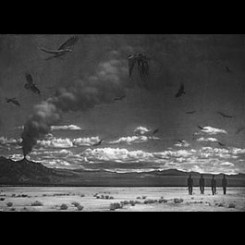Brooding with anxious foreboding and dystopian imagery, Sun Xun’s new animated film, “21G,” haunts the viewer with its dark, expressionistic atmosphere and a splintered narrative of mythology in the making. Shown recently at the Venice International Film Festival and Kunsthaus Baselland, “21G” further develops and synthesizes enigmatic elements from his previous works to deliver a powerful vision of a broken world of disenchantment on the verge of transformation, of an unsettling calm before the storm.
Like Alejandro González Iñárritu’s film 21 Grams(2003), the title of Sun Xun’s “21G” refers to the research of an American physician, Dr. Duncan MacDougall, who in 1907 claimed to have measured the weight of the human soul by recording the loss of body weight upon death (this loss of twenty-one grams being the departure of the human soul)(1). While this absurd materialist reckoning of the spiritual mimics the logic of capitalist exchange (where a particular good finds its equivalence in something completely incommensurable, like labor—or in other words, where a number is put on everything), Sun Xun seems more interested in the idea of loss—the loss of the spiritual, along with an accompanying yearning for truth and the plenitude of meaning: “History has abandoned time, and we have lost our souls,” Sun Xun writes in a rather cryptic text (2). “21G” purports to envision this fallen world of loss without offering easy answers.
The film opens with a magician figure standing on a rocky beach and looking yonder through a telescope, followed by a changing world map with the title, “Another world is like this,” thus setting up a dystopian alternative world of existence. The figure of the magician is a familiar one in Sun Xun’s oeuvre; he is fascinated by the notion of a legal liar, an appreciated trickster. In one text, Sun Xun takes on the voice of his magician: “Today, I am a magician, wearing a black high top hat and tuxedo, a professional liar! I make a living by deceiving. People are willing to buy lies from me! Lies here are like mental drugs. When an actual promise is broken once and again, lies can always make it up and turn everything to be confusing yet magnificent.” We can, of course, think of countless “Big Lies” of totalitarian governments, but Sun Xun gestures here less to Orwell’s “1984” than to a world covered with lies, true, but a deception that individuals are unwilling to change or challenge. (Incidentally, the role of the magician is not that far from that of an artist; there is, after all, an element of illusion in artistic creation. As Vladimir Nabokov once said, “Literature was not born the day when a boy crying ‘wolf, wolf’ came running out of the Neanderthal valley with a big gray wolf at his heels; literature was born on the day when a boy came crying ‘wolf, wolf’ and there was no wolf behind him.”)(3)
